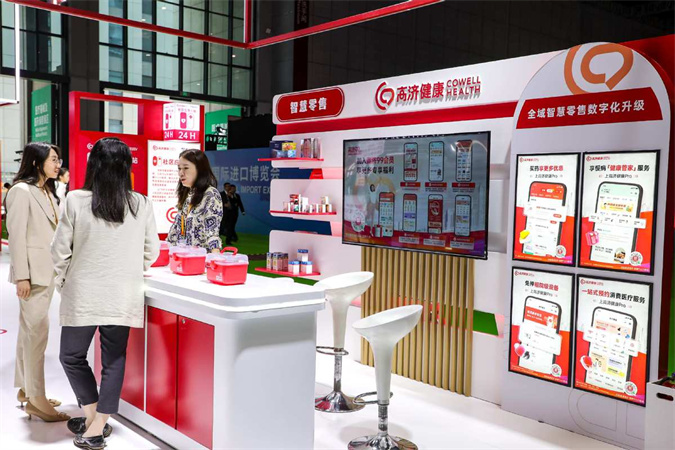

A view of the booth of Cowell Health during the sixth China International Import Expo in Shanghai in November. CHINA DAILY
Biotech firms, drug distributors, tech startups among partners in China
Multinational corporations in the pharmaceutical industry are stepping up cooperation with local partners like biotech firms and drug distributors to better tap growth potential in China.
During the sixth China International Import Expo held in Shanghai in early November, German biopharmaceutical company Boehringer Ingelheim announced a strategic cooperation agreement with Chinese high-tech company ChromX Health, to jointly push forward research on interstitial lung diseases, and search for innovative early diagnosis and intervention solutions.
Interstitial lung diseases are a large group of disorders that can cause progressive scarring of lung tissue if not treated on time and effectively, resulting in difficulty breathing or even death.
Boehringer Ingelheim said it would cooperate with leading medical device companies, high-tech startups and patient organizations to develop a patient-centered ecosystem that provides full-circle disease management for ILD patients.
"As a foreign company with a strong presence in China, we hope more local innovation companies with international competitiveness will join us in contributing to the high-quality development of the ecosystem and bring about long-term benefits to patients," said Chen Xingrong, general manager of human pharma at Boehringer Ingelheim Greater China.
Participating in the CIIE for the first time this year, Cowell Health, one of China's largest investment and operation groups in the healthcare industry, inked a myriad of strategic partnership agreements and kicked off joint projects with 17 big-name pharmaceutical and healthcare enterprises and research institutions from home and abroad.
Nearly half of such agreements and joint projects were signed or carried out together with pharmaceutical MNCs, including AstraZeneca, Novartis, Pfizer and Omron.
Behind the cooperation is Cowell Health's digital technology-empowered medicine distribution and health management capability and China's attractive and growing pharmaceutical market that MNCs are keen to tap.
So far, the company has established more than 15,000 pharmacy chain stores, with smart pharmacies covering more than 330 cities and counties in 18 provincial-level regions across the country. These pharmacies include direct-to-patient pharmacies, a novel channel for patients to get prescription drugs, and more than 216 designated pharmacies from which patients can buy specialty drugs and get reimbursement from public medical insurance programs.
"Centering on promoting '15-minute healthy living circles', our pharmacy services cover both first-tier cities and small counties, and can maximize the accessibility of innovative drugs and high-quality medical resources for patients," said Li Bo, CEO of Cowell Health.
Leveraging technologies like big data and artificial intelligence, the company has established 27 smart medicine warehouses in collaboration with more than 10,000 drug producers, to forge a resilient smart supply chain, he said.
During the CIIE, AstraZeneca and Chinese biotech firm Ascentage Pharma signed a cooperation agreement on a key phase-3 global clinical trial program for new drug registration.
According to their agreement, they will jointly carry out the phase-3 study to access the safety and efficacy of lisaftoclax (APG-2575), an investigational drug developed by Ascentage Pharma, as first-line treatment in combination with AstraZeneca's Calquence (acalabrutinib) for chronic lymphocytic leukemia or small lymphocytic lymphoma patients who have not received any treatment.
The two parties have already cooperated on a phase-2 clinical trial program on the combination treatment of the two drugs, which showed satisfactory safety and efficacy results.
Experts said China offers a huge pharmaceutical market. On top of that, the country's intensified policy support for innovation coincides with its pursuit of high-standard institutional opening-up. This backdrop makes such cooperation in the drug industry more beneficial.
Zhou Mi, a senior researcher at the Chinese Academy of International Trade and Economic Cooperation, said MNCs are expected to further ride the current trends in China, like the resilience of the local pharmaceutical supply chain getting stronger and supplies of treatments for major diseases like cancer increasing, in order to strengthen cooperation with local partners and expand growth space.
"Apart from strengthening research and development cooperation, multinational and domestic enterprises are expected to explore more ways to improve medicine logistics efficiency and enhance drug distribution," Zhou said.
According to global market research firm Frost & Sullivan, annual sales revenue of China's pharmaceutical market is expected to expand to 2.06 trillion yuan ($288 billion) by 2025, and innovative drugs will increase to account for 68 percent of the total market.